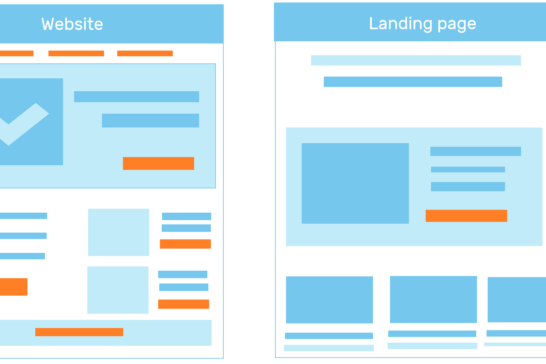
You’re excited to get a new website up, and the web design agency promised you a launch date in 3 months.
It’s been 6 months, and your website is still not live. What happened? The person or company you hired has failed. There’s no other easy way to put it.
They didn’t ask the right questions to help convey what you want to be built, and now you're stuck in an endless loop of design changes, frustration, problems, and you’re not focused on doing your real job.
Let me share a quick story…
Recently, I had lunch with a great friend. He’s one of the top-producing real estate agents in the Chicago-metropolitan area, and he wasn’t happy.
He hired a local Chicago web design company to build his new website. They promised him the world with design, performance, conversions, SEO, and so much more.
Well, it’s been 2 years, and it’s still not done. 2 years! That’s ridiculous.
Oh, and now he wants his site back, and it’s locked up somewhere in some terrible web hosting company. Again, unbelievable.
Unfortunately, I've heard this same story a couple of dozen times from friends, new clients, and many other people.
So, what's the problem?
Web design and digital marketing are dynamic fields, yet they are built upon lasting professional standards. To be most effective, modern web design agencies need to operate near the cutting edge, without forgetting the fundamentals.
They also need to understand what you want to build and the messaging you want to convey to sell your product or service.
When an agency falls short, lack of experience failed follow-through, or sloppy standards may be to blame. Fortunately, you can put those problems behind you, partnering with the right agency.
Experience is #1
Each client has unique goals. Many times, the client doesn’t know what that goal is, and that’s ok.
It’s up to the web design agency to help flush out that goal. Here are some common website goals:
- Sell more products or services
- Drive ad revenue
- Increase lead generation
- Sign up 100K email subscribers (easy tiger, let's start with 1,000)
Whatever the case, your website should accomplish that goal through a clear and intuitive call-to-action, or CTA.

Successful agencies consult closely, using direct input to help plan, create, educate, update, and help you determine what that CTA is, and here’s the kicker…then they design for it.
The entire user experience (UX) of your site should guide your visitor to the end goal.
If you don’t have an end goal, you don’t need a website. You need a marketing plan.
In today's competitive environment, you can't afford downtime, learning strategies, and sorting out web issues. That’s why you hire a professional web design company in the first place.
Otherwise, you can go find a design on a site like Wrap Bootstrap or find a freelancer, and leave the agency component out of it. All top website design agencies build custom web solutions, and never use themes.
Not only are experienced pros prepared to take the reins, guiding what you’re trying to convey, but established agencies also have experience anticipating challenges and responding when hiccups arise.
And trust me, issues will come up, especially when a plan doesn’t exist.
Whether you are just getting started with a new site or refining your approach, demand these commitments from your web design firm and digital marketing agency.
Want to put your new web design company to the test? Ask them how they failed in the past and learned from their mistakes. Ask them to show you their work. Or, you can rely on their social proof of working with large brands.
Whatever you do, make sure the experience from the design firm and UX expectations is a top priority.
End-to-End Management
The Stack Overflow developer survey identifies a Full-Stack Web Developer as the most common developer job held by those polled. In practice, however, agencies don't always bring the kind of full-stack experience you need.
To deliver the best results, your web design agency should be able to navigate front-end and back-end concerns, domain name services, and so much more, without skipping a beat.
From its earliest design stages through development, and finally web hosting, agencies capable of taking you from start to finish eliminating the many problems of a fragmented approach.
Your web strategy is a piece of a larger marketing campaign, so dragging your feet online undermines your brand and hurts your business.
Competent web development agencies respect timelines, using industry experience to accurately estimate and coordinate deadlines and deliverables.
What does a typical timeline or process look like with a web project?
- Exploration - This is where discovery happens. Getting to know your goals and helping you hone them is key for the best UX possible.
- Strategy - This is the blueprint stage. Planning, wire-framing, and timelines are provided.
- Design - Here is where the initial design concepts are provided. Your agency and you discuss, make adjustments, and create final concepts for both mobile and desktop.
- Development - Depending on the complexity of your website, this phase could take as little as a month, up to 6 months or more. Troubleshooting is also done in this phase.
- Launch - Once all is approved and tested, your website is taken live. Marketing should tie closely to this phase, such as announcements on social media.
Without a timeline and process, you’re just throwing things against the wall and hoping for results, or worse, having the experience my friend had.
Keep in mind; you might not need a full-service management approach. However, if you have good sales numbers, a top-notch web experience will increase revenue with a well-executed plan or website re-design.
SEO Integration
It's no longer acceptable that your web design agency can't develop websites without search engine optimization (SEO) in mind.
The web company you partner with needs to understand how page speed, proper meta-tagging, structured data, and many other web development checklist items play into the whole process.
For your website to have a fighting chance in search engines like Google, it needs to have all the necessary components of solid on-page SEO factors.
Make sure your website agency truly knows what mobile-first index means. Or, how to integrate a proper XML sitemap and how to format your site for international best practices.
I'm getting a little advanced here, but you get the idea. Your web team needs to know SEO, period.
Technical Understanding
Grasping HTML, CSS, JavaScript, server-side languages such as PHP, and other tools ensures your agency knows the best ways to handle each aspect of your web development project.
When understanding falls short, so does performance.
The best design agencies use every available technology to enhance your site's structure, usability, navigation, and optimization.

Using frameworks such as Bootstrap and WordPress are integral to the process, yet they are frequently underutilized by agencies that don't understand their helpful features.
I see way too often websites where the code doesn’t fully utilize the chosen framework, and the website becomes overly bloated.
The end result is slow page load times, or worse, server errors.
Don’t get me wrong. It isn't always necessary to use frameworks, but established design professionals understand their benefits and how they help make your site’s structure most effective.
Bootstrap, for instance, brings the responsive, mobile-first capabilities needed to adapt to different screen sizes - an essential element for connecting with web traffic across various preferred devices. It's critical to understand how different screen resolutions can affect your website.
WordPress is the leading CMS platform with close to 60% market share. It’s clear that WordPress is the way to go.
You might have heard that WordPress has security issues. That’s only true with development agencies that don’t know what they’re doing.
Measuring effectiveness online can be reduced to performance numbers, tracking every imaginable shred of data.
But, it isn't always possible to predict where you could be if your design agency had more success. Faltering web design agencies fall short in many ways, including these sure signs your website may not be in good hands:
Information Architecture
The way your website is structured will have a huge impact on crawling and indexation in search engines. If your web company doesn’t get this right, your visitors will not know how to complete the intended goal and leave your website.
URL structure and navigation also fall into this category and need to be defined for maximum results.
Coding
The image you present online is in your hands, so there is no excuse for sending the wrong message. When a website redesign results in unused files, broken plugins, large images, or database errors, efforts must be made to fix them and take further measures, as required.
Poor coding risks throwing server errors or page errors, both of which can make visitors and search engines think your website is a bad experience.
Validation
There are many mixed messages about the value and best approach to optimization. As a result, some design agencies remain unclear about SEO best practices.
Similarly, W3C standards provide web development success, yet web design agencies don't even take the time to validate their code. Don’t believe me? Run your website through our SEO Auditor or W3C validator.
Cross Browser Testing
Web development is a results-oriented field, so the best design agencies use feedback to fine-tune usability and UX. Testing website designs create actionable information used to tweak navigation and layout. And comprehensive cross-browser testing guarantees every user has the best possible experience interacting with your website, whether on mobile or desktop.
Continuity and Communication
Maintaining a successful web presence is a marathon, rather than a sprint. A responsive design agency should not only be able to address your immediate needs, but also articulate effective long-term strategies for your organization.
By providing comprehensive services, from design through web hosting and support maintenance, turnkey agencies reinforce continuity and stay close to all the different aspects of your project. Put simply, they have a good pulse on your website at all times.

Finding workable web solutions requires collaboration, so follow-through and communication are key building blocks between effective web agencies and their clients.
You should never feel as though you are "in the dark" or "out of touch" during your web design process.
Top web design agencies have experience blending proven design traditions with game-changing innovation.
Attuned to rapid design and development advances, the most adaptable agencies know how to get the best results from WordPress, Bootstrap, and other web tools, including usability testing.
Unsuccessful agencies, on the other hand, may lack experience communicating effective campaigns and managing projects from start to finish.
With your online effectiveness in the balance, you can't afford to work with a web design company that doesn't get it.
Instead, align your web future with a progressive, industry leader, capable of taking your online success to the next level...for a smooth and successful launch!


